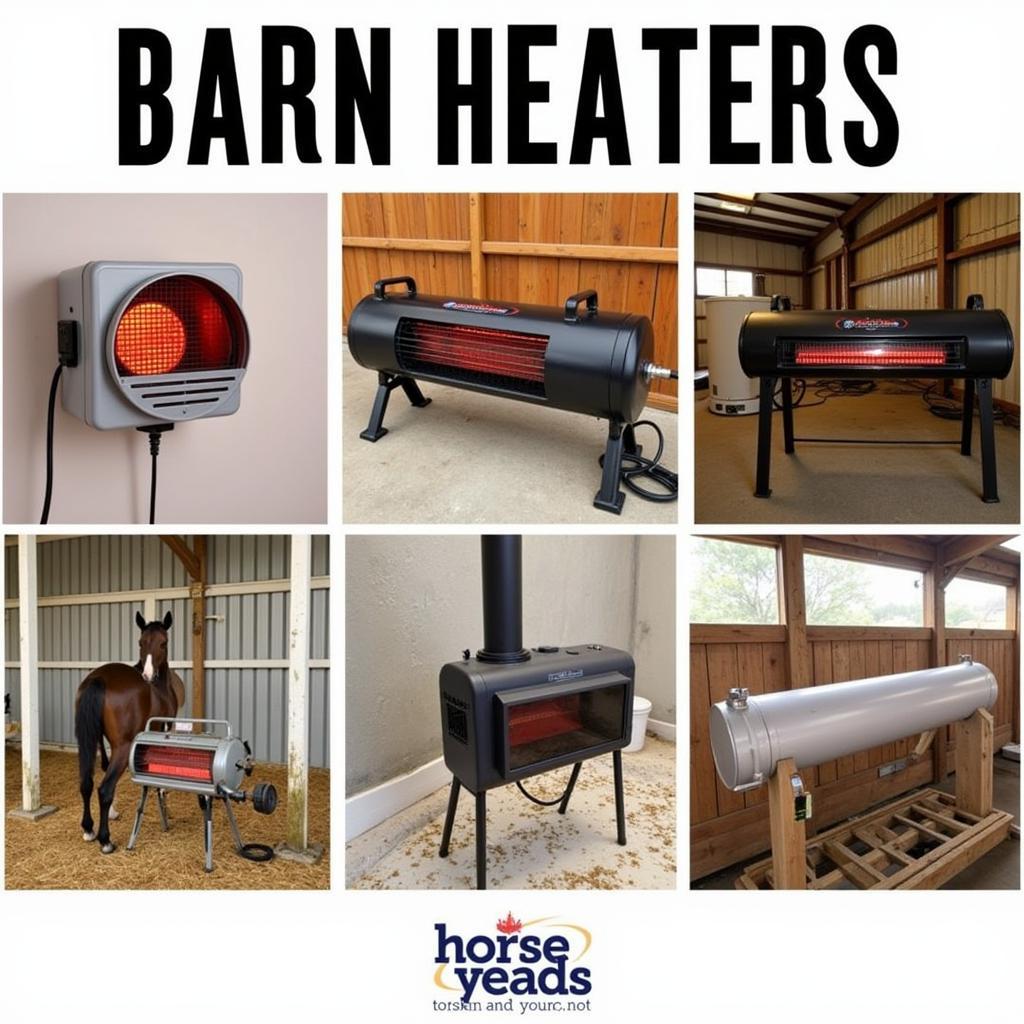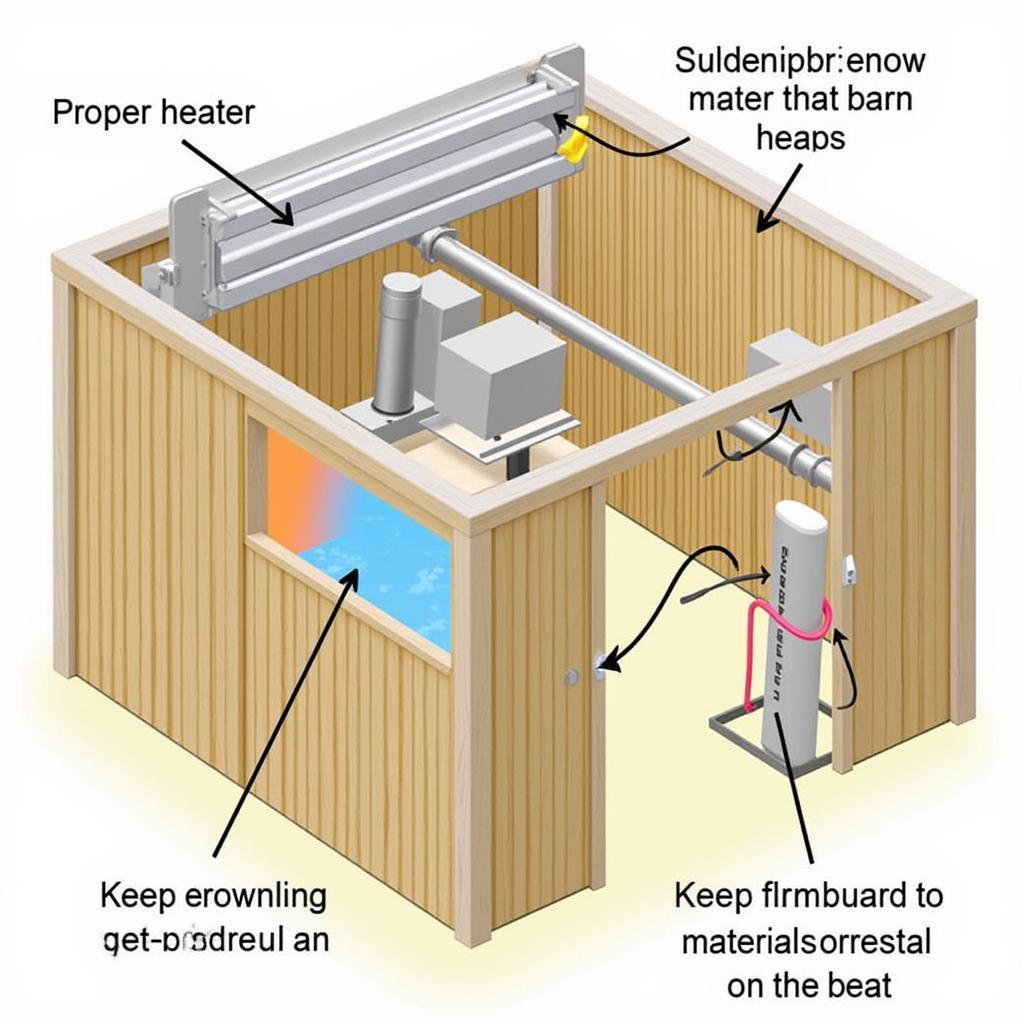As a horse owner, you understand the importance of providing a comfortable and safe environment for your equine companions, especially during the colder months. A well-heated barn can make all the difference in their health and well-being, which is where Barn Heaters For Horses come in. With various options available, choosing the right heating system for your barn can seem overwhelming. This comprehensive guide will equip you with the knowledge to make an informed decision, ensuring your horses stay warm, cozy, and healthy throughout the winter.
 Different types of barn heaters for horses
Different types of barn heaters for horses
Understanding the Importance of Barn Heaters for Horses
Horses are remarkably adaptable animals, but they still require protection from extreme temperatures. While they can withstand moderate cold with their thick winter coats, prolonged exposure to freezing temperatures, drafts, and dampness can lead to health issues. Barn heaters help maintain a consistent and comfortable temperature within the barn, preventing chills and reducing the risk of respiratory problems, especially in older horses and foals.
Factors to Consider When Choosing Barn Heaters
Before exploring the different types of barn heaters, let’s delve into the essential factors you need to consider to make the right choice for your specific needs:
1. Barn Size and Insulation
The size and insulation of your barn play a crucial role in determining the heating capacity required. Larger barns or those with poor insulation will need more powerful heaters to maintain optimal temperatures.
2. Climate and Temperature Requirements
Consider the climate you live in and the average winter temperatures. Colder climates will demand heaters with higher heat output.
3. Budget and Operating Costs
Barn heaters come with varying price tags and operating costs. Set a budget beforehand and evaluate the long-term expenses associated with each type of heater.
4. Safety Considerations
Safety should be paramount when selecting a barn heater. Look for heaters with safety features like automatic shut-off and tip-over protection, especially in barns with flammable materials.
Types of Barn Heaters for Horses
Now that you understand the key considerations let’s explore the most common types of barn heaters available:
1. Electric Heaters
Electric heaters are a popular choice for their ease of installation and relatively low upfront cost. They are available in various sizes and styles, including:
- Ceramic Heaters: Compact and portable, these heaters are best suited for smaller spaces or providing supplemental heat.
- Space Heaters: These heaters offer higher heat output and are suitable for medium-sized barns or individual stalls.
- Infrared Heaters: Unlike traditional heaters that warm the air, infrared heaters directly warm objects and surfaces, making them energy-efficient.
Pros:
- Easy to install and operate.
- Available in a wide range of sizes and styles.
- Relatively low upfront cost.
Cons:
- Can be expensive to operate, especially in larger barns.
- Potential fire hazard if not used carefully.
2. Gas Heaters
Gas heaters offer powerful and efficient heating, making them suitable for larger barns or colder climates. They typically use propane or natural gas as fuel.
- Propane Heaters: Portable and powerful, propane heaters are ideal for spot heating or emergency situations.
- Natural Gas Heaters: Require a natural gas line but offer more consistent and cost-effective heating than propane heaters.
Pros:
- Powerful heating capacity.
- Efficient and cost-effective for larger barns.
Cons:
- Requires proper ventilation to prevent carbon monoxide buildup.
- Potential fire hazard if not installed and maintained correctly.
3. Radiant Heaters
Radiant heaters provide a comfortable and even heat distribution by warming objects and surfaces directly.
- Tube Heaters: Suspended from the ceiling, tube heaters offer consistent warmth across a large area, making them ideal for barns with multiple stalls.
- Underfloor Heating: Installed beneath the barn floor, underfloor heating provides consistent and draft-free warmth, but it requires extensive installation.
Pros:
- Even heat distribution.
- Energy-efficient.
- Reduces condensation and dampness.
Cons:
- Higher upfront cost compared to other types.
- Underfloor heating requires professional installation.
Tips for Safe and Effective Barn Heating
Regardless of the type of barn heater you choose, following these essential safety tips is crucial:
- Proper Ventilation: Ensure adequate ventilation to prevent the buildup of moisture, ammonia, and harmful gases.
- Regular Maintenance: Inspect and clean your barn heater regularly to ensure optimal performance and safety.
- Fire Safety Measures: Keep flammable materials away from heaters and install smoke detectors and fire extinguishers in your barn.
- Monitor Temperatures: Use a thermometer to monitor the barn temperature and adjust the heater accordingly to maintain a comfortable range for your horses.
 Safely installing a barn heater for horses
Safely installing a barn heater for horses
Conclusion
Choosing the right barn heater for your horses is essential for their health, comfort, and overall well-being during the winter months. By considering the factors outlined in this guide and carefully evaluating the different types of heaters available, you can make an informed decision that meets your specific needs and budget. Remember to prioritize safety and follow recommended installation and maintenance practices to ensure a warm and secure environment for your equine companions.
For expert advice on selecting the ideal barn heater for your horses, contact Justus Horses USA at 0772127271 or [email protected]. Our team of equine professionals is dedicated to helping you provide the best possible care for your beloved animals.